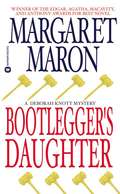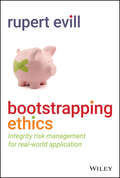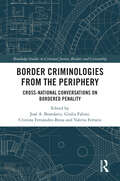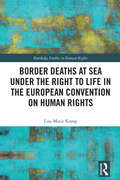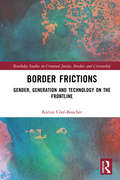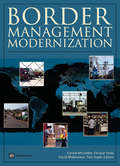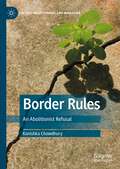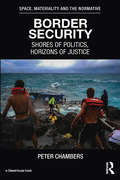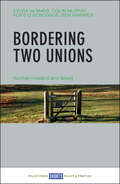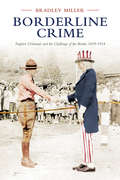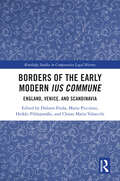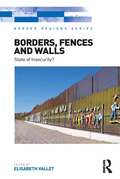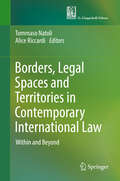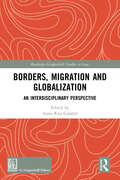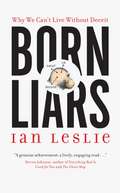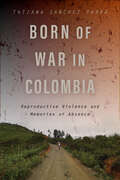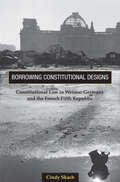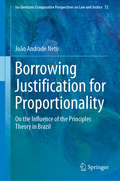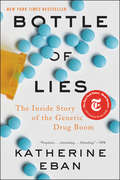- Table View
- List View
Boomsday
by Christopher BuckleyOutraged over the mounting Social Security debt, Cassandra Devine, a charismatic 29-year-old blogger and member of Generation Whatever, incites massive cultural warfare when she politely suggests that Baby Boomers be given government incentives to kill themselves by age 75. Her modest proposal catches fire with millions of citizens, chief among them "an ambitious senator seeking the presidency." With the help of Washington's greatest spin doctor, the blogger and the politician try to ride the issue of euthanasia for Boomers (called "transitioning") all the way to the White House,over the objections of the Religious Right, and of course, the Baby Boomers, who are deeply offended by demonstrations on the golf courses of their retirement resorts.
Bootlegger's Daughter
by Margaret MaronUnconventional, still unwed (at the ripe old age of 34) North Carolina attorney Deborah Knott has done the unthinkable: tossed her hat into the heated race for district judge of old boy-ruled Colleton County. The only female candidate, she's busy defending indigent clients and reeling in voters. Then suddenly, the young daughter of Janie Whitehead begs her to help solve Janie's senseless, never-solved, eighteen-year-old murder. Deborah takes on the case: following twisted, typically Southern bloodlines, turning up dangerous, decades-old secrets, and inspiring someone to go on an all-out campaign to derail her future--political and otherwise. But it will take more than sleazy smear tactics to scare this determined steel magnolia off the scent of down-home deceit...even in a town where a cool slug of moonshine made by Deborah's father can go down just as smoothly as a cold case of triple murder. <P><P> Edgar Allen Poe Award Winner.
Boots in the Ashes: Busting Bombers, Arsonists and Outlaws as a Trailblazing Female ATF Agent
by Cynthia BeebeThe thrilling career of ATF agent Cynthia Beebe is told through the lens of six-high profile cases involving bombings, arson, and the Hell's Angels. Boots in the Ashes is the memoir of Cynthia Beebe's groundbreaking career as one of the first women special agents for the Bureau of Alcohol, Tobacco, Firearms and Explosives, (ATF). A smart and independent girl growing up in suburban Chicago, she unexpectedly became one of the first women to hunt down violent criminals for the federal government.As a special agent for 27 years, Beebe gives the reader first-hand knowledge of the human capacity for evil. She tells the story of how, as a young woman, she overcame many obstacles on her journey through the treacherous world of illegal guns, gangs, and bombs. She battled conflicts both on the streets and within ATF. But Beebe learned how to thrive in the ultra-masculine world of violent crime and those whose job it is to stop it.Beebe tells her story through the lens of six major cases that read like crime fiction: four bombings, one arson fire and a massive roundup of the Hell's Angels on the West Coast. She also shares riveting never before revealed trial testimonies, including killers, bombers, arsonists, victims, witnesses and judges.
Bootstrapping Ethics: Integrity Risk Management for Real-World Application
by Rupert EvillPractical, cost-effective tools for personal and organizational risk mitigation In Risk Management: Tools, Tips, and Techniques to Help Your Organization Achieve Its Strategic Goals, accomplished fraud investigator and risk advisor Rupert Evill delivers a smart, simple, and hands-on guide to managing risk and ethics in your organization. You&’ll learn to protect yourself, your organization, and your stakeholders from regulatory and other risks with frontline-tested strategies and frameworks designed to achieve both quick wins and long-term risk mitigation. In the book, the author shows you how to create tangible economic returns by reducing organizational exposure to common—and not-so-common—risks by promoting the right values, managing conflict, prioritizing the communities you serve, and preventing discrimination and harassment against your employees. You&’ll also: Learn to manage external stakeholders and their expectations Keep your risk mitigation strategies cost-effective and straightforward so you can scale them throughout your organization Get on top of your diversity, equity, and inclusion efforts and make sure they&’re getting resultsA can&’t-miss resource for purpose-driven changemakers looking to maximize their impact at the organizations they serve and in the world, Risk Management is also the tactical and practical antidote to the seemingly endless stream of new regulations and oversight facing many modern firms.
Bora Laskin
by Philip GirardIn any account of twentieth-century Canadian law, Bora Laskin (1912-1984) looms large. Born in northern Ontario to Russian-Jewish immigrant parents, Laskin became a prominent human rights activist, university professor, and labour arbitrator before embarking on his 'accidental career' as a judge on the Ontario Court of Appeal (1965) and later Chief Justice of Canada (1973-1984). Throughout his professional career, he used the law to make Canada a better place for workers, racial and ethnic minorities, and the disadvantaged. As a judge, he sought to make the judiciary more responsive to modern Canadian expectations of justice and fundamental rights.In Bora Laskin: Bringing Law to Life, Philip Girard chronicles the life of a man who, at all points of his life, was a fighter for a better Canada: he fought antisemitism, corporate capital, omnipotent university boards, the Law Society of Upper Canada, and his own judicial colleagues in an effort to modernize institutions and re-shape Canadian law. Girard exploits a wealth of previously untapped archival sources to provide, in vivid detail, a critical assessment of a restless man on an important mission.
Border Criminologies from the Periphery: Cross-national Conversations on Bordered Penality (Routledge Studies in Criminal Justice, Borders and Citizenship)
by José A. Brandariz, Giulia Fabini, Cristina Fernández-Bessa and Valeria FerrarisThis book contributes to and broadens the field of Border Criminology, by bringing together a collection of chapters from leading scholars engaged in cross-national and comparative conversations on bordered penality and crimmigration practices, with a specific focus on research conducted in places that may be considered peripheral and semi-peripheral jurisdictions.It builds not only on global criminological debates but also on southern criminological concerns, thereby enriching border criminology conversations by expanding the epistemological boundaries of these academic debates. It asks a variety of questions. What is the part being played by detention practices at the national level and how is it changing over time? To what extent are deportation policies playing a significant role in the coercive management of unwanted noncitizens? Is the criminal justice system, and more precisely the prison system crucially supplementing the immigration enforcement apparatus in handling undocumented noncitizen groups? Should that be the case, is the increasing criminalization of noncitizens leading to the consolidation of a dual criminal justice system?It is essential reading for those engaged in Border Criminology, Southern Criminology, and Comparative Criminal Justice.
Border Deaths at Sea under the Right to Life in the European Convention on Human Rights (Routledge Studies in Human Rights)
by Lisa-Marie KompThis book focuses on border deaths at sea. It unravels how the interplay of the law of the sea and rules on jurisdiction widen the opportunity for states to make and enforce rules outside their territory, and questions whether this is also accompanied with an obligation to respect the right to life under the European Convention on Human Rights (ECHR) when doing so. By embarking upon the challenge of analysing a cross-border phenomenon in which direct encounters between state agents and the victims are few through the lens of legal obligations, the book unearths avenues for arguing that the ECHR is applicable to border deaths on the high seas and showcases the Court’s creativity in bridging the gap between the Convention and people in need of protection. Furthermore, it demonstrates that the ECHR is applicable to border deaths occurring within the territorial seas of states. It discusses the right to life, as well as the specific obligations of states in respect to border deaths at sea, and demonstrates that in many instances, EU policies fall short of the standards set under the right to life. This book will be of key interest to scholars, students and practitioners in migrant rights, international human rights law, public international law including, refugee and migration law, maritime law, and security studies.
Border Frictions: Gender, Generation and Technology on the Frontline (Routledge Studies in Criminal Justice, Borders and Citizenship)
by Karine Côté-BoucherHow did Canadian border officers come to think of themselves as a "police of the border"? This book tells the story of the shift to law enforcement in Canadian border control. From the 1990s onward, it traces the transformation of a customs organization into a border-policing agency. Border Frictions investigates how considerable political efforts and state resources have made bordering a matter of security and trade facilitation best managed with surveillance technologies. Based on interviews with border officers, ethnographic work carried out in the vicinity of land border ports of entry and policy analysis, this book illuminates features seldom reviewed by critical border scholars. These include the fraught circulation of data, the role of unions in shaping the border policy agenda, the significance of professional socialization in the making of distinct generations of security workers and evidence of the masculinization of bordering. In a time when surveillance technologies track the mobilities of goods and people and push their control beyond and inside geopolitical borderlines, Côté-Boucher unpacks how we came to accept the idea that it is vital to deploy coercive bordering tactics at the land border. Written in a clear and engaging style, this book will appeal to students and scholars in criminology, sociology, social theory, politics, and geography and appeal to those interested in learning about the everyday reality of policing the border.
Border Law
by Deborah A. RosenThe First Seminole War shaped how the United States demarcated its spatial and legal boundaries. Rooted in exceptionalism, manifest destiny, and racism, the legal framework that emerged from Andrew Jackson's invasion of Florida laid the groundwork for the Monroe Doctrine, the Dred Scott decision, and westward expansion, as Deborah Rosen shows.
Border Management Modernization
by David Widdowson Enrique Fanta Tom DoyleBorder clearance processes by customs and other agencies are among the most important and problematic links in the global supply chain. It takes three times as many days, nearly twice as many documents, and six times as many signatures to import goods in poor countries than it does in rich ones. Delays and costs at the border undermine a country's competitiveness, either by taxing imported inputs with deadweight inefficiencies or by adding costs and reducing the competitiveness of exports. As countries have come to realize the importance of trade in achieving sustainable economic growth they have progressively lowered tariffs, established regimes to encourage foreign investment and pursued opportunities for greater regional integration. This progress has, however, been undermined by the high costs and administrative difficulties associated with outdated and excessively bureaucratic border clearance processes which are now often cited as more important barriers to trade than tariffs. Inefficient border processing systems, procedures, and infrastructure result in high transaction costs, long delays in the clearance of imports, exports, and transit goods, and present significant opportunities for administrative corruption. They essentially undermine a country's competitiveness in the international marketplace. Governments around the world are therefore placing increased emphasis on border management reform designed to remove unnecessary barriers to the flow of legitimate trade across their borders. However, in spite of the widespread recognition of the need to improve the efficiency of border management regimes, Customs and other border management agencies in many countries have frequently paid lip service to the trade facilitation agenda. This book is designed to shed new light on these problems and to identify a range of strategies that will help officials meet their traditional control responsibilities while at the same time facilitating legitimate trade. It also provides advice to development professional and key policy makers about what works, what doesn't and why.
Border Rules: An Abolitionist Refusal (Politics of Citizenship and Migration)
by Kanishka ChowdhuryThis book examines both border policies and oppositional narratives of “the border,” 2011–2021, demonstrating that the term designates not merely a line of territorial control but also a set of social relations shaped by persistent, racially differentiated colonial structures and, more recently, by neoliberal modes of accumulation. These relations are shown to determine access to wealth and/or resources and to enable the management of labor, the extraction of surplus, and the accumulation of capital. Discussion in the book is informed by the history of these policies and by the critical literature on borders. Various cultural texts focusing on two border zones—the US–Mexico and the EU–Southern Mediterranean—are analyzed: specifically, two novels, two films, and two murals examined in conjunction with a music video. A path to a borderless future is suggested: an abolitionist refusal of border rules with an insistence on the necessity of abolition.
Border Security: Shores of Politics, Horizons of Justice
by Peter ChambersWhat kind of a world is one in which border security is understood as necessary? How is this transforming the shores of politics? And why does this seem to preclude a horizon of political justice for those affected? Border Security responds to these questions through an interdisciplinary exploration of border security, politics and justice. Drawing empirically on the now notorious case of Australia, the book pursues a range of theoretical perspectives – including Foucault’s work on power, the systems theory of Niklas Luhmann and the cybernetic ethics of Heinz Von Foerster – in order to formulate an account of the thoroughly constructed and political nature of border security. Through this detailed and critical engagement, the book’s analysis elicits a political alternative to border security from within its own logic: thus signaling at least the beginnings of a way out of the cost, cruelty and devaluation of life that characterises the enforced reality of the world of border security.
Bordering Two Unions: Northern Ireland and Brexit
by Colin Murray Sylvia De MarsAvailable Open Access under CC-BY-NC licence. How does Brexit change Northern Ireland’s system of government? Could it unravel crucial parts of Northern Ireland’s peace process? What are the wider implications of the arrangements for the Irish and UK constitutions? Northern Ireland presents some of the most difficult Brexit dilemmas. Negotiations between the UK and the EU have set out how issues like citizenship, trade, the border, human rights and constitutional questions may be resolved. But the long-term impact of Brexit isn’t clear. This thorough analysis draws upon EU, UK, Irish and international law, setting the scene for a post-Brexit Northern Ireland by showing what the future might hold.
Borderless Wars
by Antonia ChayesIn 2011, Nasser Al-Awlaki, a terrorist on the US 'kill list' in Yemen, was targeted by the CIA. A week later, a military strike killed his son. The following year, the US Ambassador to Pakistan resigned, undermined by CIA-conducted drone strikes of which he had no knowledge or control. The demands of the new, borderless 'gray area' conflict have cast civilians and military into unaccustomed roles with inadequate legal underpinning. As the Department of Homeland Security defends against cyber threats and civilian contractors work in paramilitary roles abroad, the legal boundaries of war demand to be outlined. In this book, former Under Secretary of the Air Force Antonia Chayes examines these new 'gray areas' in counterinsurgency, counter-terrorism and cyber warfare. Her innovative solutions for role definition and transparency will establish new guidelines in a rapidly evolving military-legal environment.
Borderline Crime: Fugitive Criminals and the Challenge of the Border, 1819-1914
by Bradley Miller The Osgoode SocietyFrom 1819 to 1914, governments in northern North America struggled to deal with crime and criminals migrating across the Canadian-American border. Limited by the power of territorial sovereignty, officials were unable to simply retrieve fugitives and refugees from foreign territory. Borderline Crime examines how law reacted to the challenge of the border in British North America and post-Confederation Canada. For nearly a century, officials ranging from high court judges to local police officers embraced the ethos of transnational enforcement of criminal law. By focusing on common criminals, escaped slaves, and political refugees, Miller reveals a period of legal genesis where both formal and informal legal regimes were established across northern North America and around the world to extradite and abduct fugitives. Miller also reveals how the law remained confused, amorphous, and often ineffectual at confronting the threat of the border to the rule of law. This engrossing history will be of interest to legal, political, and intellectual historians alike.
Borders of the Early Modern Ius Commune: England, Venice, and Scandinavia (Routledge Studies in Comparative Legal History)
by Dolores Freda, Mario Piccinini, Heikki Pihlajamäki, and Chiara Maria ValsecchiThe culture of the ius commune has been a unifying element of European and Western legal civilization. As shown by several recent studies, the influence of ius commune extended much farther than its traditional core area. This volume discusses the expansion and changes of ius commune in three significant corners of Europe, which in the classical narrative either totally or partially were left out of the picture: England, Scandinavia, and Venice. The study goes beyond the traditional question of the influence of ius commune in comparing the different constellations of normativity and legal pluralism in these regions. It investigates how not only ius commune but also other forms of normativity – such as customary law, written norms, and legal practice – were used and applied, and how they circulated. The approach helps create new narratives as to how the relationship between centers and peripheries in Europe evolved in the early modern period. These new narratives are built from bottom to top; thus, they are based on concrete source information, and they focus on the learned legal systems and their connection to the local legal sources. The collection further looks into the circulation of professors and doctors, students, and legal texts, starting from the idea that a theoretical understanding of the forms of normativity can emerge only through concrete, multidisciplinary research recognizing the tensions between global legal unification and differentiation. The book will be essential reading for researchers and academics in Legal History, Law and Religion, Comparative Legal Studies, and Early Modern History.
Borders, Fences and Walls: State of Insecurity? (Border Regions Series)
by Elisabeth ValletTwenty years after the fall of the Berlin Wall, the question remains ’Do good fences still make good neighbours’? Since the Great Wall of China, the Antonine Wall, built in Scotland to support Hadrian's Wall, the Roman ’Limes’ or the Danevirk fence, the ’wall’ has been a constant in the protection of defined entities claiming sovereignty, East and West. But is the wall more than an historical relict for the management of borders? In recent years, the wall has been given renewed vigour in North America, particularly along the U.S.-Mexico border, and in Israel-Palestine. But the success of these new walls in the development of friendly and orderly relations between nations (or indeed, within nations) remains unclear. What role does the wall play in the development of security and insecurity? Do walls contribute to a sense of insecurity as much as they assuage fears and create a sense of security for those 'behind the line'? Exactly what kind of security is associated with border walls? This book explores the issue of how the return of the border fences and walls as a political tool may be symptomatic of a new era in border studies and international relations. Taking a multidisciplinary approach, this volume examines problems that include security issues ; the recurrence and/or decline of the wall; wall discourses ; legal approaches to the wall; the ’wall industry’ and border technology, as well as their symbolism, role, objectives and efficiency.
Borders, Legal Spaces and Territories in Contemporary International Law: Within and Beyond
by Tommaso Natoli Alice RiccardiThis book examines the challenges posed to contemporary international law by the shifting role of the border, which has recently re-emerged as a central issue in international relations. It posits that borders do not merely correspond to States’ boundaries: indeed, while remaining a fundamental tool for asserting States’ power, they are in fact a collection of constantly changing spatial limits. Consequently, the book approaches borders as context-specific limits and revisits notions traditionally linked to them (jurisdiction, sovereignty, responsibility, individual rights), while also adopting the innovative approach of viewing borders as phenomena of both closedness and openness. Accordingly, the first part of the book addresses what happens “within” borders, investigating the root causes of the emergence of spatial limits and re-assessing apparent extra-territorial assertions of State power. In turn, the second part not only explores typical borderless spaces, but also more generally considers the exercise of States’ and international organisations’ powers and prerogatives across or “beyond” borders.
Borders, Migration and Globalization: An Interdisciplinary Perspective (Routledge-Giappichelli Studies in Law)
by Anna Rita CalabròThe emergence of new and substantial human migration flows is one of the most important consequences of globalisation. While ascribable to widely differing social and economic causes, from the forced migration of refugees to upper-middle-class migration projects and the movement of highly skilled workers, what they have in common is the effect of contributing to a substantial global redefinition in terms of both identity and politics. This book contains contributions from scholars in the fields of law, social sciences, the sciences, and the liberal arts, brought together to delineate the features of the migration phenomena that will accompany us over the coming decades. The focus is on the multifaceted concept of 'border' as representing a useful stratagem for dealing with a topic like migration that requires analysis from several perspectives. The authors discuss the various factors and issues which must be understood in all their complexity so that they can be governed by all social stakeholders, free of manipulation and false consciousness. They bring an interdisciplinary and comparative perspective to the social phenomena such as human trafficking, unaccompanied foreign minors, or ethnic-based niches in the job market. The book will be a valuable guide for academics, students and policy-makers.
Born Liars: Why We Can't Live Without Deceit
by Ian LeslieLying is an intrinsic part of our social fabric, but it is also a deeply problematic and misunderstood aspect of what makes us human. Ian Leslie takes us on a fascinating journey that makes us question not only our own relationship to the truth, but also virtually every daily encounter we have. On the way he dissects the history of the lie detector, how parents affect their children’s attitude to lying (and vice versa), Who Wants to Be a Millionaire?, the philosophical ambiguity of telling the truth, Bill Clinton’s presentational prowess, Wonder Woman’s lasso of truth, and why we should be wary of anyone with more than 150 Facebook friends. Born Liars is thought-provoking, anecdotally driven narrative nonfiction at its best. Ian Leslie’s intoxicating blend of anthropology, biology, cultural history, philosophy, and popular psychology belies a serious central message: that humans have evolved and thrived in large part because of their ability to deceive.
Born Well: Prenatal Genetics and the Future of Having Children (The International Library of Bioethics #88)
by Megan A. Allyse Marsha MichieThis book brings together an international collection of experts in reproductive ethics, law, disability studies, and medicine to explore the challenging future of reproduction and children. From the medical to the social and from the financial to the legal, the authors explore the expanding impact of reproductive genetics on our society. New advances in genetic technologies are revolutionizing the practice of reproductive medicine. We have expanded our ability to detect genetic changes in embryos and fetuses in ways that potentially allow to identify, treat, or prevent a growing range of diseases. The development of gene-editing technologies raises questions about the possibility of removing disease-causing variants from embryos before pregnancy implantation. The growing sophistication of prenatal genomic sequencing offers us glimpses into the whole genome of the developing fetus. And, the increasingly sophisticated science of 'gene matching' allows us greater and greater foreknowledge of how the genomes of two individuals will combine in a future child. This is an indispensable book on the newest developments in bioethics caused by the sciences.Chapter 5 is available open access under a Creative Commons Attribution 4.0 International License via link.springer.com.
Born of War in Colombia: Reproductive Violence and Memories of Absence (Genocide, Political Violence, Human Rights)
by Tatiana Sanchez ParraBorn of War in Colombia addresses why people born of conflict-related sexual violence remain unseen within transitional justice agendas. In Colombia, there are generations of children born of conflict-related sexual violence across the country. Whispers of their presence have traveled outside their communities. They also exist within the country’s domestic reparations program, which entitles them to reparations. Drawing on an immersive feminist ethnography with a community that endured a paramilitary confinement, the book reveals how a past-oriented and harm-centered model of transitional justice has converged with a restricted notion of gendered victimhood and the patriarchal politics of reproduction to render the bodies and experiences of people born of conflict-related sexual violence unintelligible to those seeking to understand and address the consequences of war in Colombia.
Borrowing Constitutional Designs: Constitutional Law in Weimar Germany and the French Fifth Republic
by Cindy SkachAfter the collapse of communism, some thirty countries scrambled to craft democratic constitutions. Surprisingly, the constitutional model they most often chose was neither the pure parliamentary model found in most of Western Europe at the time, nor the presidential model of the Americas. Rather, it was semi-presidentialism--a rare model known more generally as the "French type." This constitutional model melded elements of pure presidentialism with those of pure parliamentarism. Specifically, semi-presidentialism combined a popularly elected head of state with a head of government responsible to a legislature. Borrowing Constitutional Designs questions the hasty adoption of semi-presidentialism by new democracies. Drawing on rich case studies of two of the most important countries for European politics in the twentieth century--Weimar Germany and the French Fifth Republic--Cindy Skach offers the first theoretically focused, and historically grounded, analysis of semi-presidentialism and democracy. She demonstrates that constitutional choice matters, because under certain conditions, semi-presidentialism structures incentives that make democratic consolidation difficult or that actually contribute to democratic collapse. She offers a new theory of constitutional design, integrating insights from law and the social sciences. In doing so, Skach challenges both democratic theory and democratic practice. This book will be welcomed not only by scholars and practitioners of constitutional law but also by those in fields such as comparative politics, European politics and history, and international and public affairs.
Borrowing Justification for Proportionality: On the Influence of the Principles Theory in Brazil (Ius Gentium: Comparative Perspectives on Law and Justice #72)
by João Andrade NetoThe proportionality test, as proposed in Robert Alexy’s principles theory, is becoming commonplace in comparative constitutional studies. And yet, the question “are courts justified in borrowing proportionality?” has not been expressly put in many countries where judicial borrowings are a reality. This book sheds light on this question and examines the circumstances under which courts are authorized to borrow from alien legal sources to rule on constitutional cases.Taking the Supreme Federal Court of Brazil – and its enthusiastic recourse to proportionality when interpreting the Federal Constitution – as a case study, the book investigates the normative reasons that could justify the court’s attitude and offers a comprehensive overview of its case law on controversial constitutional matters like abortion, same-sex union, racial quotas, and the right to public healthcare.Providing a valuable resource for those interested in comparative constitutional law and legal theory, or curious about Brazilian constitutional law, this book questions the alleged universality of the proportionality test, challenges the premises of Alexy’s principles theory, and discloses more than 68 Brazilian Supreme Court decisions delivered from 2003 to 2018 that would otherwise have remained unknown to an English-speaking audience.
Bottle of Lies: The Inside Story of the Generic Drug Boom
by Katherine EbanFrom an award-winning journalist, an explosive narrative investigation of the generic drug boom that reveals fraud and life-threatening dangers on a global scale—The Jungle for pharmaceuticalsMany have hailed the widespread use of generic drugs as one of the most important public-health developments of the twenty-first century. Today, almost 90 percent of our pharmaceutical market is comprised of generics, the majority of which are manufactured overseas. We have been reassured by our doctors, our pharmacists and our regulators that generic drugs are identical to their brand-name counterparts, just less expensive. But is this really true?Katherine Eban’s Bottle of Lies exposes the deceit behind generic-drug manufacturing—and the attendant risks for global health. Drawing on exclusive accounts from whistleblowers and regulators, as well as thousands of pages of confidential FDA documents, Eban reveals an industry where fraud is rampant, companies routinely falsify data, and executives circumvent almost every principle of safe manufacturing to minimize cost and maximize profit, confident in their ability to fool inspectors. Meanwhile, patients unwittingly consume medicine with unpredictable and dangerous effects.The story of generic drugs is truly global. It connects middle America to China, India, sub-Saharan Africa and Brazil, and represents the ultimate litmus test of globalization: what are the risks of moving drug manufacturing offshore, and are they worth the savings? A decade-long investigation with international sweep, high-stakes brinkmanship and big money at its core, Bottle of Lies reveals how the world’s greatest public-health innovation has become one of its most astonishing swindles.

